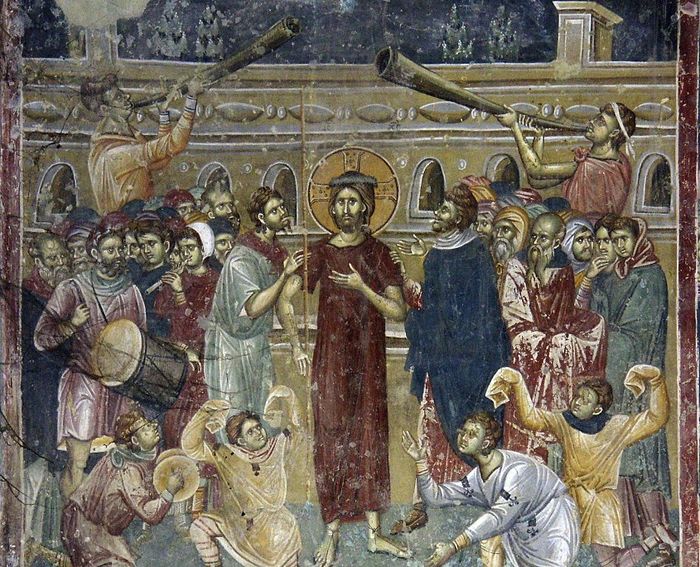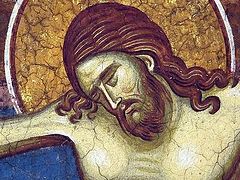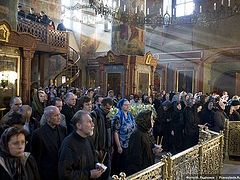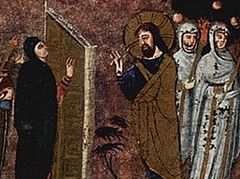Holy Week is the hardest week of the year. Wherein lies its burden? It’s probably not just in the strict fasting and the daily services—this can all be sweet and light for the faithful Christian. The difficulty is something else. In these days, the Church calls us to experience the Passion of Christ together with Him. In his books, St. Theophan the Recluse even uses the phrase, “co-suffering with Christ.” Every Orthodox person should somehow share Christ’s suffering with Him at this time, to also participate in and experience His Resurrection on Pascha—and this is probably the main burden of Holy Week.
How can we enter into co-suffering with the Lord? By our suffering for Him, say the Holy Fathers. This means an extraordinary ascetic podvig—strict fasting, vigil, prolonged prayer, reflection on the Passion of Christ. But obviously that’s not all. Let’s say a man labors as he can, trying to think about the Lord and praying fervently. But still, there remains a sense of insufficiency—after all, it’s Christ Who is crucified, not me, and it’s impossible to feel everything He felt. And this brings the understanding that the mystery of the Cross is known by an entire life, not in the five days from Holy Monday to Holy Friday. To be with Christ on Golgotha and co-resurrect with Him, we must be with Him always, in every hour of our life. If I’ve spent the whole year living according to my own will and desires, then no matter what kind of podvig I accomplish in these pre-Paschal days, I won’t suddenly be able to enter into co-suffering with Christ. The entire mystery and the whole meaning of Christianity is contained in Holy Week, and it’s foolish to think that the depth of this ocean will be revealed to someone who just barely dipped his feet in at the shore, suddenly deciding to “seriously fast” just before Pascha.
And this is precisely the burden of Holy Week—you suddenly understand how thin the layer of your Christianity is, how superficial and insignificant is your “Christian experience.” To experience the Passion of Christ in the depths of your heart, you have to be able to enter into your heart, to know the life of the heart. But in these days, you truly discover that you’re living without, not within yourself. houghts are scattered all around, all your attention is in the world, there is no concentration of the mind and the senses within your soul. Christ doesn’t live in your heart, because you don’t live there.
In these days, you’re truly horrified by your life. You realize that your usual, bustling daily life, with its rare recollections of the Lord, is, in essence, godless. The lust of the flesh, the lust of the eyes, and the pride of life (1 Jn. 2:16) fill the cup of our life to the brim. That’s why the Divine Sufferer had to go to the Cross—because billions of people have lived, live, and will live godlessly. And you won’t be able to change anything except your own being. But even here there’s practically no change—that’s the tragedy. A sinful man changes extremely slowly—a millimeter of movement in five years in the Church. After ten years, you realize there was no movement, that during this time you simply got a better look at what’s inside you, what kind of monsters are crawling around there. The healing of the soul is very slow. Little mosquito steps to the Kingdom of Heaven, as Mamanov once said.
Holy Week helps us understand that Christ must be crucified, for we are incorrigible. Here it remains only to weep with inner tears, and to say together with the words of the Divine service: “Glory to Thy Passion, O Christ; Before Thy Cross, we bow down in worship, O Master, and Thy holy Resurrection, we glorify.” It remains to stand mentally at the Crucifixion—and this is also terrible, because the Innocent One hangs on the Cross, and suffers for you, a sinner. If someone was killed for our sins in regular life, wouldn’t it be hard to watch his suffering, to look him in the eyes? The Divine Sufferer is tormented for the sins of all—including for my transgressions, which I have committed, commit, and will commit. Therefore, it’s burdensome, difficult, and unbearable to think about the Cross.
Holy Week is the judgment before the Judgment, an encounter with God before the Second Coming. It’s also a meeting with the sinful slackness of our souls, and our powerlessness to change ourselves. And all of this would have been impossible to bear had it not been for the coming Resurrection of Christ. Arise, O Lord, for our help, and redeem us for Thy name’s sake (Ps. 43:26). Arise, O Lord; save me, O my God (Ps. 3:8). Let God arise, let his enemies be scattered (Ps. 67:1). These verses from the Messianic Psalms offer us encouragement, and their meaning and hope become a comfort and support in the terrible days of Great and Holy Week—the heaviest days of the whole year.




